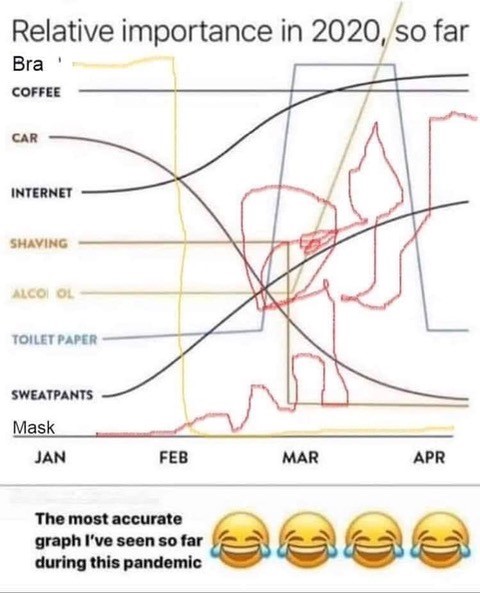Articles
Marx Mediation Memo #11
REFLECTIONS ON MEDIATING VIA ZOOM
A FEW THOUGHTS AND OBSERVATIONS
November, 2021
Obviously we’ve all been affected by the pandemic in one way or another. (For a few amusing and probably accurate examples, see the chart at the end of this article.) This has certainly been true with respect to mediation, as most if not all of you reading this are well aware. After approximately a year and a half, it’s worth taking a moment assess the impact of the pandemic on the quality of the mediation experience.
I have never been convinced that technological progress is necessarily beneficial (OK, I’m something of a Luddite), but it goes without saying that the availability of Zoom or some such platform has for all practical purposes allowed us to continue, more or less without interruption, to join together to resolve disputes. The transition to Zoom itself was much more seamless than most of us anticipated. In my case I had the benefit of the knowledgeable staff at ARC, who quickly brought me up to speed, and while they remain available during Zoom mediations, I don’t recall having had to reach out to them for assistance.
But what about the mediation experience itself? Has that been affected, and if so, how? Here, some of the subtleties and nuances of the mediation process must be considered, and it is in this regard that I have a few observations.
To begin, my experience has been that in many cases the use of Zoom has not been a factor one way or another. Mediation has proceeded more or less as it did pre-pandemic. The path toward settlement did not change in any significant respect. But, in certain situations I felt the process with Zoom was not as effective as would have otherwise been the case, though in most of those situations settlement was ultimately achieved, albeit with somewhat greater difficulty and requiring a greater expenditure of time.
Generally speaking, it is important if not essential that the mediator establish a certain sense of trust with counsel and client, often especially with the client. For example, the client (and sometimes counsel!) may be firmly wedded to a certain position or positions, sometimes so intensely that he or she is unwilling or unable even to consider alternatives, risks, concerns of the other side, etc. In this situation the mediator will look beyond the position(s) asserted, factual or legal, and seek to assess the true interests of the client, i.e., what is really motivating or of concern to him or her. If that motivation or concern can be addressed or even merely discussed, in most situations the client will then feel comfortable moving forward. This is where sitting face to face in a conference room can be invaluable. Communication itself is almost inherently more direct and effective. Sincerity, authenticity, genuine concern, facial expressions, body language and the like (on the part of the mediator as well as parties and counsel) can be much more readily communicated and observed than on a screen. (Wearing masks doesn’t help, but masks are less of an impediment in person than on screen.)
Similarly, just establishing rapport is important. In an example I often cite (forgive me if you’ve heard this before), many years ago I mediated a construction case involving many parties and attorneys. About mid-afternoon I wanted to caucus with the subcontractors. I took them across the street to a Starbucks, mainly because I was hungry. OK, Starbucks is not the world’s greatest patisserie, but any port in a storm. (This was long before it was routine at mediation sessions to provide nice things to eat virtually all day long, a practice I thoroughly appreciate.) Drinking coffee and eating pastries, the subcontractors and I made progress, so I bought up all the remaining pastries in the shop, took them back across the street and put them on the conference table for all the other parties and counsel. Everyone started eating pastries and two hours later we settled the case. Breaking bread together, everyone relaxed a bit, removed their adversarial blinders, treated each other as human beings, and worked together on resolution. Doing this on Zoom would have been problematic, to say the least.
So yes, let’s be grateful for Zoom in these times, but for me at least in some situations face to face mediation can be more effective, or at least more expeditious. Of course present safety concerns must be kept in mind, but assuming the pandemic eventually ends, I won’t resist returning to in-person mediations, while remaining available on Zoom if desired. (Even currently, with everyone vaccinated and masked in-person mediations are conceivable.)
What has been you experience with Zoom? I would be interested to know: peterjmarx@earthlink.net, or (310) 442-0052.
Questions (and suggestions) are always welcome. Feel free to contact me directly at the telephone number or email address mentioned above and listed below, and of course if you wish to schedule a mediation, contact me or simply contact my Case Manager at ARC, Ms. Nicole Bethurum, (310) 284-8224, nicole@arc4adr.com
(Don’t forget to take a look at the chart below.)
Questions (and suggestions) are always welcome. Feel free to contact me directly at the telephone number or email address mentioned above and listed below, and of course if you wish to schedule a mediation, contact me or simply contact my Case Manager at ARC, Ms. Nicole Bethurum, (310) 284-8224, nicole@arc4adr.com
(Don’t forget to take a look at the chart below.)


